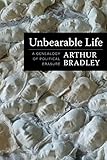Unbearable Life : A Genealogy of Political Erasure / Arthur Bradley.
Material type: TextSeries: Insurrections: Critical Studies in Religion, Politics, and CulturePublisher: New York, NY : Columbia University Press, [2019]Copyright date: ©2019Description: 1 online resourceContent type:
TextSeries: Insurrections: Critical Studies in Religion, Politics, and CulturePublisher: New York, NY : Columbia University Press, [2019]Copyright date: ©2019Description: 1 online resourceContent type: - 9780231193382
- 9780231550284
- 320.01 23
- JF801 .B69 2019
- online - DeGruyter
- Issued also in print.
| Item type | Current library | Call number | URL | Status | Notes | Barcode | |
|---|---|---|---|---|---|---|---|
 eBook
eBook
|
Biblioteca "Angelicum" Pont. Univ. S.Tommaso d'Aquino Nuvola online | online - DeGruyter (Browse shelf(Opens below)) | Online access | Not for loan (Accesso limitato) | Accesso per gli utenti autorizzati / Access for authorized users | (dgr)9780231550284 |
Browsing Biblioteca "Angelicum" Pont. Univ. S.Tommaso d'Aquino shelves, Shelving location: Nuvola online Close shelf browser (Hides shelf browser)

|

|

|

|

|

|

|
||
| online - DeGruyter Shadow Archives : The Lifecycles of African American Literature / | online - DeGruyter V. S. Naipaul's Journeys : From Periphery to Center / | online - DeGruyter The Japanese Discovery of Chinese Fiction : The Water Margin and the Making of a National Canon / | online - DeGruyter Unbearable Life : A Genealogy of Political Erasure / | online - DeGruyter Notes to Literature / | online - DeGruyter Oath Keepers : Patriotism and the Edge of Violence in a Right-Wing Antigovernment Group / | online - DeGruyter Vernacular Industrialism in China : Local Innovation and Translated Technologies in the Making of a Cosmetics Empire, 1900-1940 / |
Frontmatter -- CONTENTS -- ACKNOWLEDGMENTS -- INTRODUCTION -- 1. Unbearable: Foucault and the Birth of Nihilopolitics -- 2. Ungood: Augustine's City of Cacus -- 3. Untimely Ripped: Macbeth's Children -- 4. Uncommon: Hobbes's Martyrs -- 5. Incorruptible: Robespierre and the Already Dead -- 6. Unleashed: Schmitt and the Katechon -- 7. Undead: Benjamin and the Past to Come -- CONCLUSION -- NOTES -- BIBLIOGRAPHY -- INDEX
restricted access online access with authorization star
http://purl.org/coar/access_right/c_16ec
In ancient Rome, any citizen who had brought disgrace upon the state could be subject to a judgment believed to be worse than death: damnatio memoriae, condemnation of memory. The Senate would decree that every trace of the citizen's existence be removed from the city as if they had never existed in the first place. Once reserved for individuals, damnatio memoriae in different forms now extends to social classes, racial and ethnic groups, and even entire peoples. In modern times, the condemned go by different names-"enemies of the people;" the "missing," the "disappeared," "ghost" detainees in "black sites"-but they are subject to the same fate of political erasure.Arthur Bradley explores the power to render life unlived from ancient Rome through the War on Terror. He argues that sovereignty is the power to decide what counts as being alive and what does not: to make life "unbearable," unrecognized as having lived or died. In readings of Augustine, Shakespeare, Hobbes, Robespierre, Schmitt, and Benjamin, Bradley asks: What is the "life" of this unbearable life? How does it change and endure across sovereign time and space, from empires to republics, from kings to presidents? To what extent can it be resisted or lived otherwise? A profoundly interdisciplinary and ambitious work, Unbearable Life rethinks sovereignty, biopolitics, and political theology to find the radical potential of a life that neither lives or dies.
Issued also in print.
Mode of access: Internet via World Wide Web.
In English.
Description based on online resource; title from PDF title page (publisher's Web site, viewed 02. Mrz 2022)


